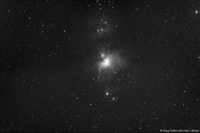Being January, Orion once again is the obvious choice for deep-sky imaging. But how about some deep-sky imaging with a difference? What about some infrared imaging? Silicon-based CCD detectors will detect photons up to 1um in wavelength, although the efficiency of CCDs drops to near zero at this long wavelength. Deep red extends to around 6900 Angstrom or 690 nm or if you prefer 0.69 um. So a filter that only transmits beyond say 720 nm would be useful in deep-sky imaging as an infrared filter for your Silicon CCD imager.
It is great that photography provides us with such a filter, at amazingly low prices, in a large range of sizes – so finding one that will fit your optical setup should not be too difficult. It is unfortunate that the photographic variety do not come in the standard 48mm diameter size as preferred by astronomers, but a 49 mm photographic filter can easily be accommodated in most optical trains. These filters are labelled as R72 in photography shops and this means they transmit wavelengths beyond 720 nm, but not shorter (visible) wavelengths. They are therefore almost custom made for infrared astronomy using Silicon detectors!
The M42 region in Orion is rich in infrared emission with wavelengths extending from 1 um to over 100 um. Unfortunately amateurs won’t be able to image at the interesting near, middle and long infrared wavelengths as this requires specialist detectors. However, new and interesting data from 720 nm up to around 950 nm can be collected using a Silicon CCD and an R72 filter. This image of M42 was taken in January using an R72 filter on an SXVF-M25C one shot colour camera.
You may have to search around a bit for a suitable choice of target. Unfortunately a good H-alpha source is not necessarily a good very near infrared source as well. I found this to my cost when I spent quite some time imaging the Rosette nebula with an R72 filter and ended up with virtually no data (from the Rosette) at all! So as with many things in this fascinating hobby, it is very well worth experimenting – you may find something brand new!!
Clear January skies!!


